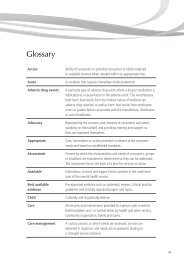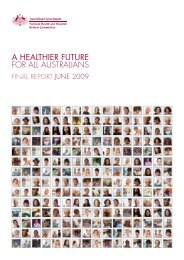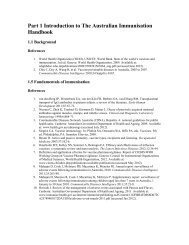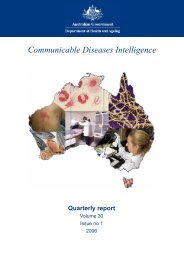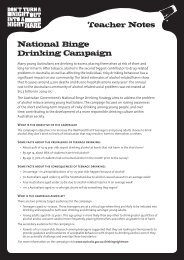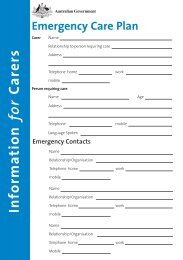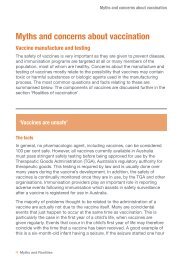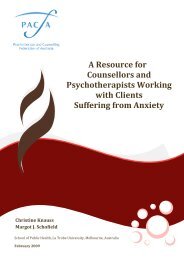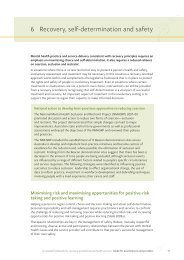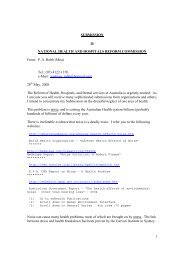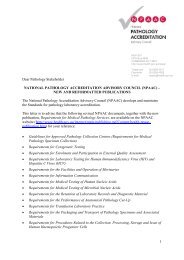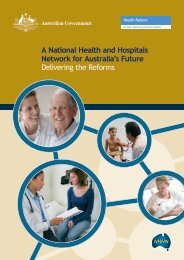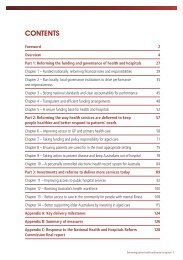National Amphetamine-Type Stimulant Strategy Background Paper
National Amphetamine-Type Stimulant Strategy Background Paper
National Amphetamine-Type Stimulant Strategy Background Paper
You also want an ePaper? Increase the reach of your titles
YUMPU automatically turns print PDFs into web optimized ePapers that Google loves.
61<br />
and secondary), for professional development, for parents, and in preparation for tertiary<br />
education. These are the first school drug education resources to focus on preventing and<br />
reducing harm from drug use by building resilience and connectedness in students.<br />
To date, there is a stronger evidence base for the effectiveness of school-based campaigns<br />
in targeting licit drugs, such as alcohol and tobacco, compared to illicit drugs, including<br />
ATS (Loxley et al., 2004). A major criticism of such approaches is their limited capacity to<br />
address the complex variety of factors associated with the uptake and continuation of drug<br />
use (Stubbs et al., 2004). An additional concern is that those young people most in need of<br />
such information and assistance are those who may not currently be attending school<br />
(e.g., engaged in truancy, been suspended or expelled). Consequently, the ‘Reconnecting<br />
Youth Program’ targets youth at risk of dropping out of school and those with multiple<br />
problems (Eggert et al., 1994). This program incorporates personal growth classes, social<br />
activities and school bonding to teach resiliency skills that moderate the effect of risk<br />
factors for drug abuse and has shown evidence of improving school performance as well<br />
as enhancing several psychological and emotional attributes of participants. Strategies<br />
targeting at-risk youth outside of educational institutions include peer education and those<br />
outlined below in the sub-section on ‘young people’.<br />
The issue of the effectiveness of school-based drug education campaigns generated<br />
contention and debate at some consultation forums. While some participants held that these<br />
strategies were important and effective, others argued that school-based programs can be<br />
problematic. In particular, concern was raised about the uptake of evidence based school<br />
drug education, as decisions to implement such programs were locally determined (e.g., by<br />
school principals) leaving a significant proportion of schools without effective and evidencebased<br />
programs. Two comments illustrate some of the issues:<br />
People are not always keen to take on the responsibility for the policy context of these<br />
campaigns or to deliver them at the school level.<br />
Although the curriculum includes a Health component dealing with drugs, its delivery<br />
is dependent on schools and the inclination and capacity of staff.<br />
Some participants recommended that there was a need for specialist educators and<br />
perhaps also ex-drug consumers to address school students as part of the drug education<br />
programs. Others suggested that rather than focus on drugs per se, a broader approach<br />
was needed to address psychosocial and cultural factors that improved general health and<br />
well being, such as social emotional wellbeing, self esteem and life skill programs. Others<br />
argued that any program adopted should be evidence-based:<br />
Best practice for school drug education is to focus on social skills such as resilience,<br />
decision making rather than respond to specific drug phases.<br />
Despite some debate about the best approaches to school drug education, there was<br />
consensus around the need to develop the capacity of teachers to implement school<br />
based drug prevention and harm reduction programs. There was also general agreement<br />
that school drug education programs should be ongoing, as opposed to short term, for<br />
example being repeated and reinforced in each school year. It was suggested that drug<br />
education programs should commence as early as Year 6 or 7 of primary school, and



